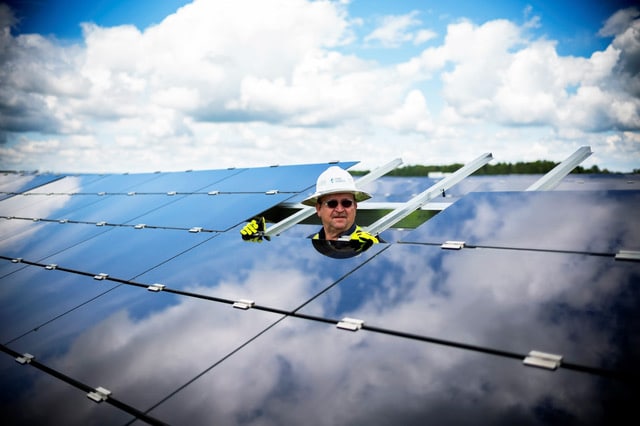Duke Energy North Carolina survived and thrived in 2020, with record-setting solar

An unpredictable year saw the utility add 5,500 residential and commercial solar systems in North Carolina, contract for the largest floating solar system in the Southeast, and add three major players to the company’s Green Source Advantage program.

Despite all of the factors that made 2020 the year it was, Duke Energy reports that it was a record-breaking year for the company in North Carolina, with roughly 5,500 residential and commercial customers in the state installing solar systems last year.
The company attributes a significant portion of this installation figure to its five-year, $62 million rooftop solar rebate program.
Residential customers who are approved for rebates will get a $0.60/W credit for their installed solar system, up to 10 kW or $6,000, while businesses are eligible for a $0.50/W credit and nonprofits are eligible for $0.75/W. These nonresidential projects cap out at 100 kW of installed capacity, meaning a maximum credit of $50,000 for businesses and $75,000 for nonprofits.
In the company’s own solar pursuits, Duke connected nearly 350 MW of solar capacity in North Carolina last year, headlined by the 69 MW Maiden Creek solar facility in Catawba County and the 25 MW Gaston County solar facility in Bessemer City.
While not as substantial in the capacity department, Duke also came to an agreement with the U.S. Army’s Fort Bragg to install a 1.1 MW floating solar system on Camp Mackall’s Big Muddy Lake, as part of a $36 million energy services effort.
These capacity additions helped Duke to reach the milestone of having more than 3.7 GW of solar capacity connected to its energy grid in North Carolina. The company also reached its goal of owning and contracting for 8 GW of wind, solar, and biomass generation around the nation, a goal which has since been doubled to 16 GW by 2025.
2020 was also a milestone year for Duke’s Green Source Advantage (GSA) program, which allows large-scale customers to offset power purchases by securing renewable energy from projects connected to the Duke Energy grid. In 2020, the utility came to terms with the City of Charlotte, Bank of America, and Duke University on GSA contracts.
Charlotte’s agreement is for a 35 MW installation, set to be built within the city. Bank of America agreed to a 25 MW project in the Piedmont region, and Duke University came to terms on a 101 MW deal from three solar facilities in the state.

